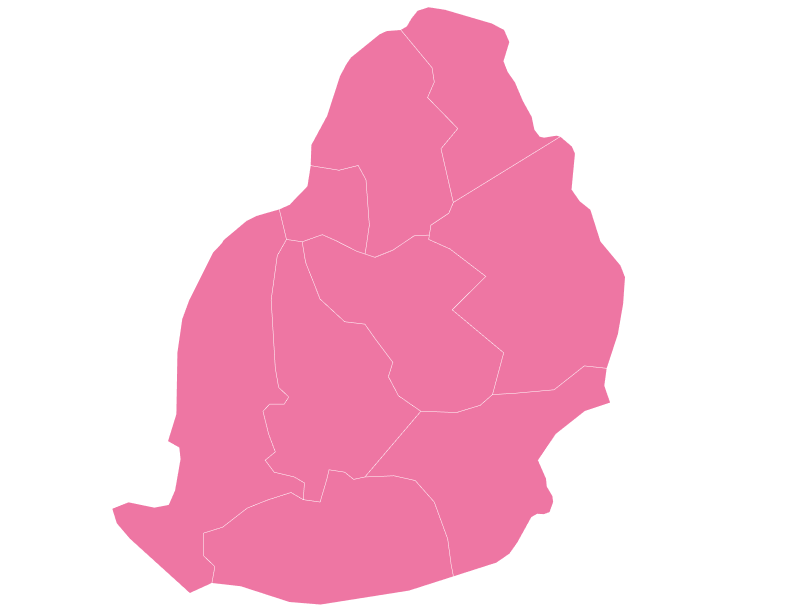Africa
Importing to Mauritius
Mauritius, an idyllic African island bordering France and the Seychelles by sea, is more than white sand and crystalline waters. It’s the wealthiest country in Africa per capita and has big plans for its digital transformation, making it a strategic location for importers.

Tax
up to 15%
Duties
up to 15%
Lead Times
3-5 weeks
Restricted Items
Products of Certain Manufacturers; Second-Hand Goods
Best Carrier Option
Freight Forwarder
Non-Working Days
Saturday, Sunday, and Public Holidays
Prominent Languages
Mauritian Creole, French, and English
Exporting and Importing To Mauritius
The Mauritian government has been progressively liberalizing trade, mainly by lowering various import tariffs. Tariff rates range from 0% to 30%, with VAT at 15%. Mauritius has proven to be very open to adopting international best practices as it collaborates with organizations like the SADC, the OEC, and the UN.
Mauritius Digital Economy
In less than 15 years, the Mauritian ICT sector has grown to the third pillar of its economy, with a 5.6% annual contribution to its GDP.
In 2018, the Ministry of Information Technology, Communication and Innovation presented its Digital Mauritius 2023 Strategic Plan. After consulting the World Bank and the IMF, the plan focuses on five pillars. These are to build a digital government, enhance ICT infrastructure, foster innovation, manage talent, and develop cybersecurity.
The plan’s vision is “a highly interconnected society with access to the knowledge required for an Innovation-driven culture.“ The plan sees opportunities in ICT infrastructure for cloud-based services, Big Data, AI, IoT, and new startups, all contributing to positioning Mauritius as an innovation and ICT hub for Sub-Saharan Africa. International organizations also have opportunities to assist Mauritius in building cybersecurity frameworks.
With island-wide 4G network coverage and 87.27% internet penetration, Mauritius is ready to integrate new tech innovations to propel its new digital age. This gateway to Africa is a strategic import location for tech importers.
Population
1.26 million
Biggest Industry by Export
Textiles
Capital City
Port Louis
Biggest Industry by Import
Refined Petroleum
Mauritius Trade Agreements
Mauritius is a member of the World Trade Organization (WTO) and has signed a range of trade agreements. It is a member of the Generalized System of Preferences (GSP), the Common Market for Southern and Eastern Africa (COMESA), and the Southern African Development Community (SADC). It also benefits from the African Growth and Opportunity Act (AGOA), which allows duty-free trade of certain items with the US. It has similar benefits with the EU under the Interim Economic Partnership Agreement (iEPA).
Mauritius has signed an Economic Partnership Agreement (EPA) with the UK to enable duty-free exports to the UK. Along with 24 other African countries, it signed the Africa Continental Free Trade Agreement (AfCFTA), allowing members to trade on preferential terms.
Mauritius also has a Preferential Trade Agreement with Pakistan, facilitating tariff concessions for various goods. Additionally, it benefits from trade preferences on over 600 products and duty-free trade for over 300 products with India through the Mauritius-India Comprehensive Economic Partnership Agreement (CECPA).
Mauritius was the first African country to sign a trade agreement with China. The Mauritius-China Free Trade Agreement opened up duty-free trade for Mauritius into Chinese markets for many goods. Lastly, it has an FTA with Turkey, allowing duty-free access for goods like industrial products to the Turkish market.
Temporary Imports to Mauritius
Mauritius allows temporary imports for up to 6 months. This is best done using the ATA Carnet administered by the Mauritius Chamber of Commerce and Industry. The ATA Carnet covers goods for trade fairs and exhibitions, commercial samples, and professional equipment. However, it does not cover goods for repair.
Importer of Record IOR Mauritius
With offices in Mauritius, TecEx is familiar with exporting and importing to this destination. The administrative requirements are vast and stringent, including correct HS codes and accurate goods valuations for correct duties calculations, license applications, and smooth shipments.
With TecEx Mauritius as your IOR, we take on your compliance responsibilities and import risks. We will ensure that your documents are all in order, all permits and clearances are obtained, and all regulations are followed for seamless customs clearance with no delays or penalties.
You don’t need to become a compliance expert to benefit from Mauritius’s growing digital economy or ICT hub. With TecEx Mauritius, you can focus on your innovations while we get your goods to their destination, whether it’s through Port Louis harbor or Sir Seewoosagur Ramgoolam International Airport. With the TecEx Mauritius DDP shipping solution, we can complete your shipment from door to door, even carrying out the last-mile delivery.
Unique Pain Points
Importing goods to Mauritius requires submitting a Customs Declaration or Bill of Entry (BOE) via TradeNet. Other trade documents, such as invoices, bills of lading, Certificates of Origin, packing lists, and relevant permits, must also be electronically submitted. Once accepted by Mauritian customs, duties and taxes must be paid.
However, a short payment has significant penalties. Revaluations are common in Mauritian customs, so it’s vital to submit accurate valuations when applying to import goods. Penalties could incur additional duties and taxes, a fine valued at 25% of the short payment, or difficulties with future imports.
Various permits may be required to import goods into Mauritius. All imports require clearance from the ICTA. The Mauritius compliance requirements can take up to 20 days to fulfill.
Countries Associated with Mauritius
Asia
China
Africa
Zimbabwe
Specific Compliance Regulations
Mercury Free Certificate (MF) Mauritius
Batteries containing mercury are strictly prohibited from being imported to Mauritius. Importing batteries and cells to Mauritius requires an MF certificate from an accredited laboratory.
Dealer’s License | ICTA Type Approval
Importers of radio and telecommunication equipment to Mauritius require a Dealer’s License from the Information Communication Technologies Authority of Mauritius (ICTA). This is necessary for goods with HS codes beginning with 8517, which mostly covers wireless goods.
This approval takes up to 7 days to acquire.
Mauritius Standards Bureau MSB Clearance
MSB clearance is required to import and sell certain products with HS code 8544 in Mauritius to ensure they meet Mauritian health, safety, and environmental standards. This also applies to Power Distribution Units. Clearance takes around 24 hours to obtain.
MSB certification is valid for 2 years once it’s been issued and is renewable.
CFC-Free Certificate
Goods like refrigerators, freezers, and refrigerating equipment require a CFC-free certificate from the country of origin to be presented to Mauritian customs upon import.
Import Permit for Secondhand Goods to Mauritius
Secondhand goods require an import permit before shipping to Mauritius. Failure to obtain this permit will result in a penalty of MUR 5,000 (USD 160).
Your global trade solution for Mauritius
Fill in the form to get in touch with us, and our experts will contact you with customs compliance solution to suit your needs.



